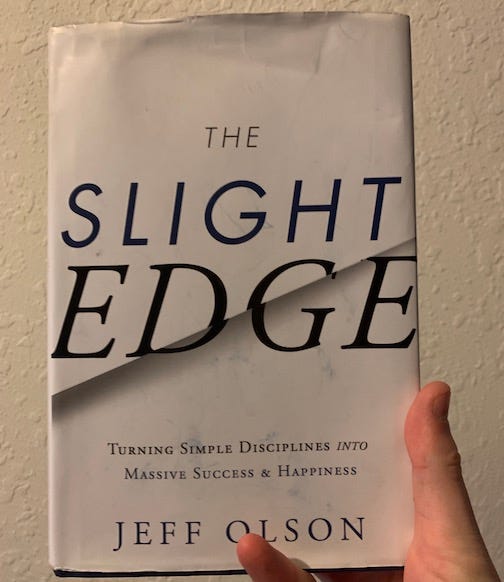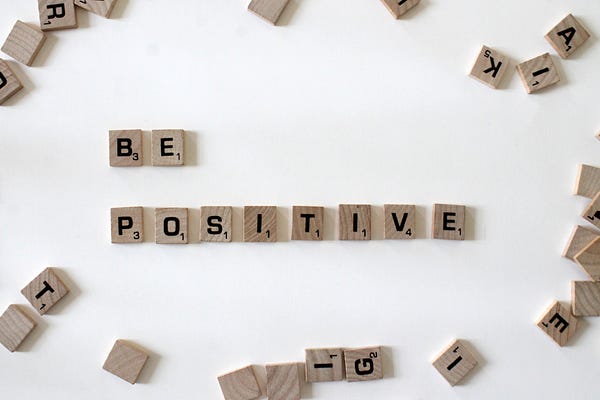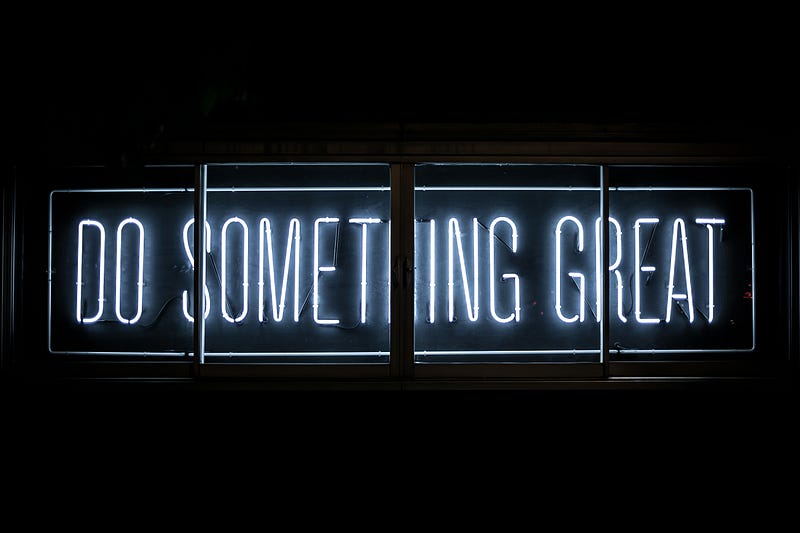The Slight Edge by Jeff Olson

My good friend Nick Berger got this book for me a few years ago. He read it himself the end of 2017 and then shared it with me and said it was a must read. Well… it most certainly was. This book was great the first time, and just as great the second and now the third time that I’ve read it. I made a commitment to continue rereading this book each and every December. There is always something more to be learned and improved upon and this book focuses on those very important things that are needed for success.
It’s easy to do and easy not to do. That’s what the author emphasizes. And as other authors emphasize over and over, time and time again, what separates the greats from those who are not as successful is that the greats are okay with boredom. The greatest, most successful people do not get deterred by boredom because they know that it is part of the path to mastery.
Pg. 10, You could call these “little virtues” or “success habits.” I call them simple daily disciplines. Simple productive actions, repeated consistently over time. That, in a nutshell, is the slight edge.
“As water reflects the face, so one’s life reflects the heart.” — Proverbs 27:19 NIV
This has been a very impactful Bible verse for me in recent months. Who am I? Does my life reflect who I am and who I want to be? I needed to make changes and I did. Look at my actions and you’ll see my philosophy. Period.
Pg. 21, Your philosophy is what you know, how you hold what you know, and how it affects what you do. You can look at anyone’s actions and trace back through the attitudes behind those actions, to their source: the philosophy behind the attitudes. Show me what a man does, and I’ll show you his philosophy.
Show up. Get it done. Do it again and again and again. It’s the slight edge in practice. It’s easy to do and easy not to do. She could have drank alcohol one night, why not right? Yet, she never did. Easy to do and easy not to do.
Pg. 36, From that point on, my mother was a single mom, raising a family of three kids. She worked, she came home, she cooked, she took care of us. She never drank, never cussed, never complained, not once, not ever. And she was always there for me, no matter what.

This made me laugh because of how true I see it to be. The magnifying glass that is social media is so prevalent and provides often too deep of a view into people’s lives. Why do we need to see every little thing? Why do we need to show every single thing? What kind of expectations does that give off for others and ourselves? In the same way, if we are told that a project should take 3 hours to complete and we can do it in 2, what do we do? Especially if you’re getting paid by the hour, what incentive is there to complete the project early? For many people, there isn’t one.
Pg. 53, There’s a principle called Parkinson’s Law, after the man who coined it, Professor Cyril Northcote Parkinson. Parkinson’s Law goes like this: “Work expands to fill the time available for its completion.” Here’s how that looks when you apply it to the world of personal finances: Whatever I have, I spend. Actually, in today’s world it usually means something more like this: Whatever I have, I spend that — plus a little more.
“Those who can be trusted with little will be trusted with much.”
Is there any coincidence that this works? It’s a Biblical principle. Results matter, everything else is secondary. EVERYTHING. When you wake up in the morning, do you get up or do you press snooze? When there’s water besides soda, which do you choose? Easy to do and easy not to do.
Pg. 76, The principal value was this: Slow down to go fast. In other words: you want big results? Good — then do the little things. Just do them consistently and persistently.
This was one of the biggest messages from the entire book for me. We can plan all we want but if we never set sail and leave the docks, it’s all for nothing. We can finish our lives with a long list of successes and failures or a long list of tomorrows and some days — it’s up to us.
Pg. 82, Have I got some sobering news for you: “some day” doesn’t exist, never has, and never will. There is no “some day.” There’s only today. When tomorrow comes, it will be another today; so will the next day. They all will. There is never anything but today.

What an incredible example. The positive exuded from her and radiated through all that she did. Positivity all the time always. This is what I strive to be as well. Especially as a parent. Research shows that children hear 8 no’s to each yes. That’s not the way that I will be parenting — at least not the way I intend to parent.
Pg. 97, It wasn’t until years later, well into the twenty-first century, that I began to understand the secret to my mom’s happiness — and another crucial element to the slight edge.
Growing up, I never heard her say a negative word, not about anything or anyone. No matter how bad things were, she always somehow found something positive in the situation.
She never talked in negative terms. She always found the good in everything. She made a regular practice of counting her blessings. She did kind things for people. She probably never used the words “practice positive perspective” in her life, but that’s what she did, every moment of every day.
None of these are incredibly time consuming or incredibly difficult — we can all do them. But, how many of us do all five each day? As a sixth, I’d add in daily Bible reading.
Pg. 104, Happy habits:
1. Each morning, write down three things you’re grateful for.
2. Journal for two minutes a day about one positive experience you’ve had over the past twenty-four hours.
3. Meditate daily.
4. Do a random act of kindness over the course of each day.
5. Exercise for fifteen minutes daily.
This is so important and something that I’ve seen as more and more essential as I have continued to mature and grow older. As my sister also grows older and looks towards college in the fall of 2020, I can see how important this is for her also. It’s very tolling to have negative people around us and surrounding all that we do, it’s incredibly draining to say the least. I need people who push me as much as I push myself, and they are the type of people that I prioritize being around.
Pg. 199, The best thing I can do to serve the world around me is to keep myself in a state where I can best contribute — and I can’t do that if I’m being dragged down by an environment of cynicism and self-pitying complaint. I want to spend my time with people who have an infectiously positive attitude, who bring energy and vitality to the table, and who brighten the room.
Turn in the right direction and walk. Step by step by step by step. We’ll get there eventually. Just. Keep. Going.
“It is much harder to stop something already in motion than it is to start something that is stopped. It is even harder still to induce motion into something that is without movement.” — Harrison Wendland
Pg. 205, “Be not afraid of going slowly; be afraid only of standing still.” — Chinese Proverb
Just a week or just a lifetime? We’ve got eternity to look forwards to, are we preparing effectively? Are we storing up for ourselves, treasure in heaven? (Matthew 6:29–31)
Pg. 225, Be Committed for the Long Haul
Showing up is essential.
Showing up consistently is powerful.
Showing up consistently with a positive outlook is even more powerful.
But doing all that for a week… is just doing it for a week.
Some of the people I most admire wake up and center their days on questions like the following one. Some ask, “Who can I most help today?” or, “What will I be able to do that most helps someone?”
Pg. 254, What one simple, single, easy-to-do activity can you do, day in and day out, that will have the greatest impact on your health, your happiness, your relationships, your personal development, your finances, your career, and your impact on the world?
No matter how busy, get it done. Period. I continued to see parallels between this book and Tim Grover’s book Relentless and for good reason. Consistency is everything and actions, repeated over time, created our future.
Pg. 255, My daily health discipline is to workout for thirty-five minutes a day. I know that no matter how busy I am, I can do thirty-five minutes — so thirty-five minutes it is.
What is your dominant aspiration? If you don’t have one, is that an issue? If your controlling desire is to relax or have sex, is that an issue? It might be, but that depends upon whom you ask, we are all different and unique.
Pg. 260, In that great classic of personal development, As a Man Thinketh, James Allen put it this way:
“You will become as small as your controlling desire, or as great as your dominant aspiration.”

Always ask this. Trust, but verify. Evaluate.
“Trust your gut. But also test it. Before you do anything concrete, the data has to agree.” — Marc Randolph
Pg. 271, Successful people are always asking: “Who am I spending time with? Are they the people who best represent where I want to be headed? They form powerful relationships with positive people; they carefully build mastermind groups, work with those groups regularly, and take them seriously; and they do not hesitate to disassociate themselves, when necessary, from people who are consistently negative and threaten to drag them down.

Here’s my biggest takeaway: Commit. Get it done. Repeat. Repeat. Repeat. Evaluate. Commit. Get it done. Repeat. Repeat. Repeat. That’s it. It’s simple, isn’t it? Then do it. It’s a challenge. I’ve been off and on at the gym for years. I’m in arguably the best shape of my life but still much thinner than I desire to be and I could eat cleaner and I could sleep more. It all comes down to the seemingly easy decisions. So why is it then that Steve Jobs and Mark Zuckerburg are notorious for wearing the same outfit nearly all the time? One less decision to make, right? It only makes sense. If willpower is limited, we need to create systems that allow us to thrive with the disciplines that we desire to have. Remember, your actions create your attitude, your actions, and your results, which combine together to create your life. EVERYTHING matters.
“How you do anything is how you do everything.”
I gave this book a 4/5